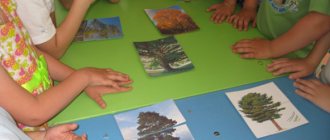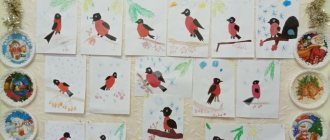Role-playing game in the preschool educational institution “Our Skillful Cooks”
Role-playing game in the preschool educational institution “Our Skillful Cooks”
Playing with toy kitchens has a beneficial effect on a child’s early development and stimulates the development of logical thinking and fine motor skills. During the game, the child's imagination and imagination develops beautifully.
Kitchen is one of the favorite games for girls of preschool and primary school age. Its obligatory condition is the participation of several people, because what’s the point in cooking for yourself and treating yourself? Manipulating plates, cutlery and food develops the child's dexterity. The rules of serving and the ability to use a napkin are quickly and easily learned, and a rich stock of knowledge is accumulated about the methods of culinary processing of products and their compatibility. You can unobtrusively mention the benefits of vegetables and fruits, talk about the fact that different people have different gastronomic preferences.
Purpose of the game:
Through play, strengthen and deepen children’s interest in the profession of a cook, cultivate respect for work, the ability to work in a team, broaden their horizons, develop creative thinking and imagination.
Tasks:
1.
Teach children to expand the boundaries of the role-playing game “
Cook
” with new plot twists, plan the development of events, change the plot (if necessary) into a more interesting course of the game.
2.
Develop imagination and knowledge about the profession of a cook, encouraging initiative, resourcefulness and independence.
3.
Enriching children's vocabulary with words: (vegetables, fruits, meat, fish, cereals, etc.).
4.
Develop dialogical speech.
5.
Cultivate a desire to bring joy to people, the pleasure of preparing food and feeding it to others.
Equipment for the game:
Game module “Kitchen”: stove, sink. Utensils: pots, pans, microwave, kettle, mixer, plates, cups, spoons, forks, knives; cutting boards; napkins. Products: vegetables, fruits, bread, etc.
The teacher's task:
1.
Help the children organize the game, make it exciting and action-packed.
2.
Do not suppress their imagination, independence, spontaneity.
3.
Create interest in a particular life event, influence the imagination and feelings of children.
4.
To excite children with life events and labor feats, so that they want to imitate them.
Preliminary work:
1.
Excursion to the preschool kitchen.
2.
Stories from a teacher about the profession of a cook.
3.
Conversations: about the rules of etiquette, table setting, rules of conduct in public places
4.
Reading fiction, V. Mayakovsky “Who should I be?”, riddles about the profession of a cook.
5.
Examination of illustrations and pictures depicting the profession of a cook.
6.
Didactic games “Visiting”, “Setting the table”, “Polite words”; “Who should I be?”, “Guess the profession.”
7.
Memorizing a poem about chefs.
Progress of the lesson:
Educator:
Now I’ll tell you riddles about what we’re going to play now, and you guess.
1.
Walks around in a white cap with a ladle in his hand. He prepares lunch for us: Porridge, cabbage soup and vinaigrette. (Children-Cook)
2.
Tell me, who cooks cabbage soup so deliciously, Smelly cutlets, Salads, vinaigrettes, All breakfasts, lunches? (Children-Cook)
3.
He creates at the stove, as if he soars on wings. Everything is seething around him, the Kitchen is his forge. (Children-Cook)
4.
Who cooks cabbage soup, cutlets, borscht, dumplings, vinaigrettes; Cooks porridges and compotes, Fries entrecotes in oil, Mashes potatoes with a masher, Stirs soup with a ladle? He has a cheerful speech... And what is his name? ... (Children-Cook)
Educator:
Children tell a poem about cooks.
1.
Child.
Who is most needed in the dining room? Who cooks hundreds of dishes? Everyone will immediately answer in unison: His name is a cook.
2.
Child.
The cooks are very deft at peeling carrots with a knife, grinding cheese on a coarse grater: Back and forth, here and there.
3.
Child.
They stir the soup with a ladle and mash the potatoes with a masher. They cut the dill with a knife. Whack-whack-whack and into the bowl!
4.
Child.
It turns out delicious so that they personally take samples from the dishes so that our kids are always well-fed!
5.
Child.
He fries, steams and bakes - Here is the pie, here is the porridge... And for that, honor to him, Our gratitude!
6.
Child.
Maybe they won't believe me? Will someone smile? There is no more needed job on earth than a cook!
Educator:
Well done guys, do you know how to behave at the dinner table?
(Children's answers)
.
Away and at home for dinner.
You can't talk to your neighbor
No need to slurp and sniffle,
And also turn your head.
Distribution of roles:
Children independently distribute responsibilities, who will work as cooks and who will be guests. Then they change.
Guys, do you think cooking is easy? (Children's answers.)
Agree. In fact, cooking is a very responsible activity! To cook well, chefs study for a long time. And at first, things don’t always work out well for them; mistakes happen.
Educator:
Now we have assigned the roles, now choose the attributes you need and let’s start the game. Children set the table with dishes and cutlery. The cooks are preparing lunch. During the game, the teacher helps the children with unobtrusive advice.
Did you guys enjoy being chefs today? ( Children's answers.)
What did you like and remember most?
( Children's answers.
) Thank you, guys. You were all attentive, smart and resourceful. Watch your mothers cook.
At the end of the game we conduct an analysis.
1.
What products does the chef use to cook? (children's answers: from vegetables, fruits, meat, fish, cereals, etc.).
2.
Do you think the profession of a cook is interesting? (children's answers).
3.
Do people need this profession? (children's answers).
4.
What kind of person do you think a chef should be? (neat, kind, attentive). That's right, he always has clean clothes, clean hands, and the cook is attentive in preparing every dish.
5.
Did you like this game?
Long-term plan for the ROLE-PLAYING GAME “Bakery” in the preparatory group.
Conversation about the progress of the game:Question options:
What is the name of the bakery?
What events will take place there?
Sketching a game plan: what's first, what's next, what's next.
Choosing a contract method for discussing the game plan: lots, counting, etc. Creating a storyline (what game situations can be used: a competition for the name “bakery”, about opening a bakery (BEFORE THE GAME),
CONVERSATIONS with children from personal experience about bakeries, conversations about what they read, saw; “Rules for using baking stoves”;
viewing photos, video presentations, video film fragments, etc.
SKETCHING of events in the game.
CONVERSATION with children: who will be who in your game.
You are like (Manager-client (customer),
Dough mixer - baker,
Butcher-baker) what will you do, how will you talk to clients, what will you talk about (for each role). The teacher pays attention to the means of expression: timbre, pitch of voice, gestures, facial expressions, behavior.
What do you need for the game, if this is not there, then what will you replace it with, where will you play in such a way that it is convenient for you and does not disturb others. How can you divide the group space (working with space markers - sketching or working with cards)
Joint play between the teacher and the children * (B - main role, secondary, then vice versa, then “fan of roles”)
Involving the teacher in a joint game in a new role or introducing a new situation. (“An online order has arrived”; “A large cake to order”; “Foreign guests”).
CONVERSATION with children based on photos and story pictures about events in the bakery
CONVERSATION about the rules (at the beginning, during the game, at the end of the game)
RULES for children: ROLE + GAME ACTIONS AND ROLE DIALOGUES.
SKETCHING the rules using a pictogram or drawing (understandable to children)
GAME EXERCISE: who does what
Who interacts with whom, how. Ex. “What comes first, what comes next for every profession”
Organization of design, creation of furniture for cafes,
Organization of manual labor for the production of necessary attributes (menu, holiday program, etc.)
Carrying out a variety of outdoor games, a selection of attractions that may be used in the game (drawn)
Selection of necessary AUDIO means: musical
CONVERSATION with children after the game.
-you liked the way you played
-Why
(it was interesting, they played together, I was able to play this role well...)
- you managed to play together (everyone played their roles)
- who was who in your game
- and you are like a baker, dough mixer, manager
(the child must explain, in accordance with the role, what “I WAS GOOD” means)
- and it was convenient for you to play,
you didn't interfere with each other
-Did everything work out for you?
-what can you change (invent) next time to make it even more interesting?





